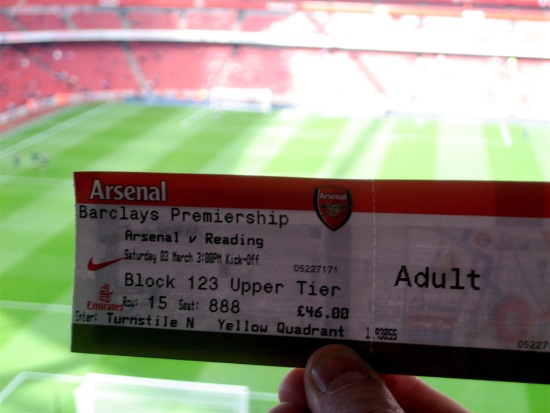As arguably the most popular sport in the world, football has a huge international following, with fans willing to spend a small fortune on tickets to see their favourite team play. With stadiums around the country packed full of eager spectators and busloads of fans arriving at rival grounds each weekend for away games, the football industry is one of the few which has not seemed overly affected by the recession.

Yet despite the fact that football managers, players and shareholders are continuing to do a roaring trade in the UK, for the fans it seems that attending matches is becoming pricier year after year. In a survey conducted by BBC Sport, entitled the Price of Football, it was revealed that the average price for a cheap seat in any of the top four English divisions is now £21.24 – an increase of 11.7 per cent from last year. Put another way, prices for football tickets have risen at 5 times the rate of national inflation.
Furthermore, when examining the cost of the whole day out to a football match in Britain, it was found that only three of the 92 registered clubs in England offer fans a price lower than £20 per person. Clearly, being a football fan is becoming more expensive, as last season 12 of the 92 clubs fell into the £20 or less bracket.
Lord Triesman, former chairman of the Football Association (FA), told BBC Sport he was “very disappointed prices keep going up” despite the fact that inflation dropped from 2.5 per cent to 2.2 per cent last month. He puts the increasing costs down to the salaries paid to top level footballers – an issue which has caused some level of debate in the UK for some years now.
He continued; “I think it will prevent the next generation from really seeing live football. Most of the causes of the increases are driven by the salaries paid to players.
“As it is, it will become a sport in which relatively well-off people will be able to go and watch it live and nobody else.
“That seems to me to be a tragic historic reverse.”
Yet some Premier League teams are endeavouring to keep costs at affordable levels for their fans, with Newcastle United proven to offer the best value day out for their home games. Fans visiting St James’ Park can purchase a ticket, a pie, a cup of tea and a programme for only £23. Of course, Newcastle United are facing monetary controversy of their own at the moment, with the Board considering a sponsorship deal with pay day loan company Wonga – something which many fans believe to be little more than funding their club through the financial woes of people across the country.
Newcastle United’s low prices compare favourably with Arsenal, who have the dubious honour of being the most expensive club for the second year running. Although the cheapest day out at the Emirates stadium comes in at £34.30, fans wishing to splash the cash on better seats can end up paying around £134.40 – up from £109 the previous year.
Ivan Gazidis, Arsenal chief executive, defended his club’s pricing scheme, saying; “We have seen ticket prices rise across the game – what we have done is try to hold those prices down, for example our Capital One Cup prices have been £10 for adults and £5 for children.
“What we know, because of the tremendous take up, is that there are people who want to watch top class football but for whom price is a factor.
“That is something we have to be continually conscious of.”
Of course, clubs often have to pay out a huge amount in order to attract high calibre players. However, the question cash strapped football fans across the country must be asking is whether attracting top international players is worth pricing out the average spectator from live events.
Do you think there should be a limit set on the amount football clubs can charge fans for tickets and merchandise? How do you think football clubs could go about attracting the best players whilst still allowing fans access to the game?
Previous Post
Starbucks in UK Tax Row